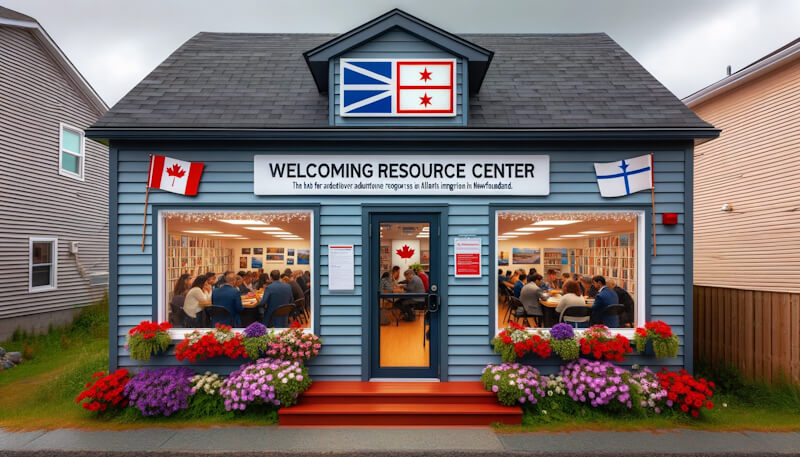Moving to Newfoundland - A Comprehensive Guide
Your Quick 30-Second Answer!
Moving to Newfoundland and Labrador offers a unique blend of opportunities and lifestyle choices. The Newfoundland and Labrador Provincial Nominee Program (NLPNP) caters to diverse groups including skilled workers, graduates, and entrepreneurs, with various streams adapting to specific skills and situations. Prospective residents should research the local job market, particularly in sectors like technology, healthcare, agriculture, and aquaculture. Embracing the local culture is essential, with a strong affinity for seafood and a unique local accent. Be prepared for colder and windier weather conditions. The province’s main cities like St. John’s, Corner Brook, Grand Falls-Windsor, and Gander each offer distinct living experiences, from vibrant city life to quiet, nature-rich towns. Housing in picturesque coastal towns offers affordable living and low crime rates, ensuring a high standard of living. Though public transport is somewhat limited, there are ample ferry services and a good road network. This concise overview provides a snapshot of what life in Newfoundland and Labrador has to offer for those considering making this culturally rich and scenic province their new home.
For an in-depth overview, please see the "Table of Contents" below.
What You Need to Know - Moving to Newfoundland
Welcome to our comprehensive resource on moving to Newfoundland, where we dive deep into the essentials of starting a new chapter in this charming Canadian province. Here, we unfold the unique blend of vibrant culture, scenic landscapes, and promising opportunities that Newfoundland offers. Whether you are drawn by the allure of Labrador's wilderness or the bustling life in St. John's, this guide will provide you with all the insights you need for a smooth transition to Newfoundland's welcoming shores. Let's embark on this journey to explore the captivating experiences that await you in this picturesque corner of Canada.
TABLE OF CONTENT
Introduction and Overview
1. Overview of Moving
Living in Newfoundland
2. Life in Newfoundland
3. Housing and Living
4. Best Places and Lifestyle
Education, Employment, Healthcare
5. Education and Employment
6. Healthcare and Medical
Culture and Immigration
7. Cultural and Geographic Aspects
8. Immigration and Legal Aspects
Additional Information
9. Common Questions (FAQs)
10. Where to Find Resources

1. Overview: Moving to Newfoundland
1.1 Welcome to Newfoundland, Canada's Eastern Treasure
Newfoundland, located in the easternmost part of Canada, is a land of rugged beauty and rich history. In this guide, we will explore various aspects of Moving to Newfoundland, providing you with all the essential information you need. Newfoundland is not just a place, it's an experience. From its vibrant culture to its serene landscapes, this island offers a unique way of life that captivates everyone who visits.
1.2 Why Consider Moving to Newfoundland?
Are you thinking about Moving to Newfoundland? Whether it's for the breathtaking natural scenery, the friendly communities, or the opportunities for personal and professional growth, Newfoundland has a lot to offer. This island, known for its friendly people and a slower pace of life, provides a perfect blend of modern living and traditional charm. It's a place where you can find peace without sacrificing the conveniences of modern life.
As we embark on this journey through Newfoundland, we will cover everything from the cost of living to the educational and job opportunities, cultural experiences, and the immigration process. Our aim is to provide you with a clear and comprehensive understanding of what it's like to live in this beautiful Canadian province.
Moving to Newfoundland and Labrador means understanding the region's unique characteristics and immigration programs. Here's a concise guide:
- 1. Newfoundland and Labrador Provincial Nominee Program (NLPNP): This program includes various streams like the Skilled Worker, Express Entry Skilled Worker, Priority Skills, International Graduate, International Graduate Entrepreneur, and International Entrepreneur Categories. Each caters to different skills and situations, facilitating immigration for skilled workers, graduates, and entrepreneurs.
- 3. Job Market: Research the local job market to ensure there are opportunities that match your skills. Sectors like technology, healthcare, agriculture, and aquaculture are in high demand.
- 4. Lifestyle and Culture: Embrace Newfoundland and Labrador’s culture, which includes a strong affinity for seafood and a unique local accent. The province is known for its cultural diversity and rich heritage.
- 5. Weather: Prepare for a climate that is colder and windier than most places, a key consideration for those moving here.
- 6. Cities and Towns: The province offers varied living experiences across cities like St. John’s, Corner Brook, Grand Falls-Windsor, and Gander, each with its own character and opportunities.
- 7. Housing and Living: The picturesque coastal towns offer affordable housing and low crime rates, contributing to a high standard of living in a beautiful maritime setting.
- 8. Transportation: While public transport is limited, there are ferries linking Newfoundland Island with mainland Canada and a good road network across the province.
In summary, moving to Newfoundland and Labrador offers a unique lifestyle with cultural richness, diverse job opportunities, and beautiful landscapes. It's important to research job prospects, understand the local culture and weather, and consider the different living experiences across its cities and towns. The NLPNP provides various pathways for skilled individuals looking to make this picturesque province their home.
2. Life in Newfoundland

2.1 Cost of Living: Affordability in the Eastern Province
When considering Moving to Newfoundland, one of the first questions many have is about the cost of living. Compared to the rest of Canada, Newfoundland offers an affordable lifestyle without compromising on quality. The province boasts some of the lowest housing prices in North America, making it an attractive destination for those seeking a new home without the hefty price tag often found in bigger cities.
The average cost of buying a home in Newfoundland is significantly lower than in provinces like British Columbia or Ontario. For instance, in cities like Corner Brook or the provincial capital of St John, you can find homes at prices that are quite reasonable compared to the national average. Renting is also more affordable here, with the province's average monthly rent being below-average numbers seen in other Canadian provinces.
Additionally, the overall expenses in Newfoundland, including utilities, groceries, and transportation, are generally lower. This lower cost of living allows residents to enjoy a high quality of life without the financial stress found in more expensive regions.
2.2 Standard of Living: Embracing a Peaceful Life
Moving to Newfoundland also means embracing a slower pace of life, which is a significant draw for many. The province is known for its friendly people and tight-knit communities, creating a safe place to live and raise a family. Newfoundland’s low crime rate further contributes to this sense of security, making it one of the safest places in Canada.
The standard of living is further enhanced by the province's natural beauty and outdoor activities. Newfoundland is a haven for nature lovers, offering everything from hiking and fishing in pristine environments like Gros Morne National Park to enjoying the coastal beauty and engaging in water sports. The island of Newfoundland and the surrounding small islands offer endless opportunities for adventure and relaxation alike.
Moreover, the cultural richness of Newfoundland adds to the standard of living. The province is steeped in old-world traditions, with a local culture that includes everything from folk music to unique culinary experiences. The friendly people here are always eager to share their culture and history, making newcomers feel right at home.
3. Housing and Living Arrangements in Newfoundland

3.1 Finding a Home: Comfort within Reach
One of the most appealing aspects of Moving to Newfoundland is the availability of affordable housing. Whether you are looking for a family home or a more compact living space, Newfoundland offers a range of housing options that cater to different needs and budgets. The cost of housing in this Canadian province is notably lower than in many other parts of North America, making it an attractive option for those seeking their own space at reasonable prices.
In cities like St. John, which is not only the provincial capital of St. John but also one of the oldest cities in North America, and other localities like Corner Brook and Mount Pearl, the real estate market is diverse. You can find everything from modern apartments to traditional houses that echo the province's rich history. The average cost of buying or renting a property in Newfoundland is competitive, offering excellent value for money.
The Canadian Real Estate Association provides valuable insights into the Newfoundland housing market, indicating a trend of high demand but still maintaining relatively low prices. This makes it an excellent time for potential homeowners to invest in property in the province.
3.2 Living Arrangements: Embracing Newfoundland’s Charm
Settling into a new home in Newfoundland is more than just a change of address; it's about embracing a lifestyle. The province offers easy access to both urban amenities and the tranquility of nature, ensuring a balanced life. Whether you choose to live in the busier city of St. John or in a small community, you will find a welcoming environment that combines modern living with old-world traditions.
For those moving to Newfoundland for the first time, the island of Newfoundland and its surrounding areas offer a mix of living experiences. From the vibrant streets of the capital city to the peaceful surroundings of smaller towns, each area has its unique charm. The province is known for its low-crime area, making it a safe choice for families and individuals alike.
Additionally, the slower pace of life in Newfoundland is perfect for those looking to escape the hustle and bustle of bigger cities. Here, you can enjoy a more relaxed way of life, surrounded by friendly people and the stunning natural beauty that the province is known for.
4. Best Places, Lifestyle and Other Information

4.1 Discovering the Best Places and Lifestyle
When exploring the idea of Moving to Newfoundland, identifying the best places to live is crucial. Newfoundland Island offers a range of living environments, from the bustling streets of St. John, the provincial capital of St. John, to the quieter town of Grand Falls-Windsor. Each area has its unique charm and appeal, catering to different lifestyles and preferences.
St. John, known as the capital city of St. John, is not just the administrative center but also a hub of culture and activity. Here, one can stroll down George Street, famous for its vibrant nightlife and cultural events. For those preferring a quieter life, towns like Grand Falls-Windsor offer a more laid-back atmosphere, still rich in community spirit and natural beauty.
According to Statistics Canada, Newfoundland has been recognized as one of the safest cities in the country, adding to its appeal as a great place to live. The majority of the people in Newfoundland enjoy a lifestyle that includes a unique province’s diet, consisting of fresh seafood and local delicacies, reflecting the island's rich maritime heritage.
4.2 Addressing Common Concerns
One of the main reasons people consider Newfoundland as their home province is the quality of life it offers. Here are some common questions and answers for those thinking about Moving to Newfoundland:
- What is the cost of living like? The Canadian Rental Housing Index indicates that Newfoundland offers affordable housing options, with costs generally lower than in busier cities like those in Nova Scotia.
- How easy is it to travel around the province? Despite the long distances between towns, the Trans-Canada Highway and local transport services make commuting and exploring the province convenient.
- What are the job prospects for international graduates? Newfoundland welcomes international graduates, especially those who have studied at local institutions, offering various opportunities in diverse sectors.
- How has the population trend affected the province? In recent years, despite a population decline, Newfoundland has focused on revitalizing its communities and economy, making it an excellent province for both work and leisure.
- What makes Newfoundland unique? Newfoundland's rich history, unique cultural experiences, and stunning natural landscapes make it stand out as a desirable destination for many.
5. Education and Employment in Newfoundland

5.1 Academic Opportunities: A Hub for Learning and Growth
Newfoundland, particularly through institutions like Memorial University of Newfoundland, offers excellent educational opportunities. This university is not just a center for higher learning but also a beacon for international students from around the globe. With a diverse student body, the university provides a range of programs that cater to various interests and academic needs.
Memorial University of Newfoundland is known for its comprehensive programs and supportive environment for both local and international students. The university’s curriculum is designed to provide practical knowledge and skills that are valuable in the job market. For students for whom English is a second language, there are excellent ESL programs to help them integrate smoothly into the Canadian academic system.
5.2 Employment Landscape: Opportunities for Skilled Workers
Moving to Newfoundland opens doors to a variety of job opportunities, particularly for skilled workers. The job market in Newfoundland has seen growth in recent years, fueled by the province's growing economy. Key sectors that offer employment opportunities include healthcare, education, technology, and the service industry.
The province is actively working to attract skilled workers to fill job vacancies and contribute to the local economy. Programs like the Labrador Provincial Nominee Program are designed to help skilled workers and their families immigrate to Newfoundland and Labrador, offering a pathway to permanent residence.
Moreover, the job market in Newfoundland is evolving to include more opportunities for remote work. This shift has been particularly beneficial in recent years, allowing individuals to work for national or international companies while enjoying the quality of life that Newfoundland offers.
In addition to traditional employment, Newfoundland’s local culture and tourism industry provide unique job opportunities, especially in cities like St. John, which is the provincial capital of St. John, and other major cities. These opportunities allow individuals to engage in work that is not only financially rewarding but also culturally enriching.
6. Healthcare and Education in Newfoundland

Healthcare and other benefits in Newfoundland offer comprehensive coverage and support for residents, including newcomers. Here's an overview based on the information gathered:
6.1 Healthcare in Newfoundland:
1. Medical Care Plan (MCP): Newfoundland and Labrador's MCP is a publicly administered comprehensive medical insurance plan, covering the costs of insured physician services for residents who meet the eligibility criteria. This includes coverage of insured medical services received in a hospital under the Hospital Insurance Plan (HIP).
2. Eligibility for MCP: To become a beneficiary of MCP, individuals must reside in the province and meet certain criteria. Proof of intention to remain in Newfoundland and Labrador, such as employment letters or lease agreements, is required.
3. Hospital Insurance Plan (HIP): HIP covers the cost of insured hospital services, including physician visits and hospital diagnostic procedures.
4. Prescription Drug Program (NLPDP): This program offers coverage for many prescription drugs to treat conditions like diabetes, high blood pressure, and more. It helps eligible residents who lack private health insurance or other programs providing coverage for prescription drugs.
5. Private Health Insurance: While waiting for public insurance approval, it's recommended to have private health insurance to cover any immediate medical needs. The Newfoundland and Labrador Private Health Insurance Program (NLPHP) covers costs that aren't covered by public insurance plans during the waiting period.
6.2 Other Benefits:
1. HealthLine: A comprehensive resource for health information, offering support for social assistance recipients, mental health support, or crisis management. HealthLine provides information on health conditions, medications, and a wide range of health topics.
2. Application for Health Cards: Newcomers can apply for their Newfoundland and Labrador health card any time during the year. The process includes filling out an application form and submitting necessary documents. The card is usually received within two weeks of application.
3. Coverage for International Workers: International workers with valid work permits can also be eligible for MCP coverage.
4. Non-Qualified Candidates: Certain categories of individuals, like tourists or temporary residents staying for less than a year, are not eligible for MCP registration.
The healthcare system in Newfoundland and Labrador is designed to ensure that residents, including newcomers, have access to necessary medical services, contributing to the overall well-being and safety of the community. For more detailed information and specific queries, it is advisable to refer to the official Newfoundland and Labrador government websites and healthcare resources.
7. Immigration, Legal and Governmental Aspects

7.1 Navigating Immigration to Newfoundland
Moving to Newfoundland, the easterly province of Canada, involves understanding the immigration process which is vital for those aspiring to become permanent residents. The province of Newfoundland and Labrador offers specific immigration programs to facilitate this process. These programs are designed to meet the province’s labor market and demographic needs.
One such program is the Newfoundland and Labrador Provincial Nominee Program (NLPNP), which allows the provincial government to nominate individuals for permanent residency who have the skills and experience deemed beneficial for the province. The eligibility criteria for this program include having a valid job offer from a Labrador employer or being an international graduate from a recognized post-secondary institution in the province.
Additionally, the Atlantic Immigration Pilot Program, a partnership between the Government of Canada and the Atlantic Provinces, including Newfoundland, is another pathway. This program aims to help employers in Atlantic Canada hire qualified candidates for jobs they haven’t been able to fill locally. These candidates can then apply for permanent residency.
7.2 Legal Considerations and Government Support
Understanding the legal aspects of Moving to Newfoundland is essential. The process of obtaining a work permit, and eventually permanent residency, is governed by specific eligibility requirements. It's important for potential immigrants to be aware of these requirements, which can include language proficiency, educational qualifications, and work experience.
The provincial government of Newfoundland provides various resources and support to help immigrants navigate these legal processes. Their comprehensive guide on immigration offers important information, ranging from how to apply for a work permit to becoming a permanent resident. This guide is a valuable resource for anyone looking to make the province their home.
Furthermore, the capital city of St. John, which is also the provincial capital of St. John, offers additional resources and community support for newcomers. With its own dictionary of interesting English dialect and a rich history, including the descendants of the culturally extinct Beothuk tribe, St. John is not only a great place to live but also a busy city rich in culture and history.
8. Cultural and Geographic Highlights of Newfoundland

8.1 Exploring the Natural Beauty and Outdoor Activities
Newfoundland, often referred to as an 'island of Newfoundland', is a paradise for nature lovers. Its unique geographic location in the Atlantic Provinces of Canada offers a landscape that is both rugged and breathtakingly beautiful. The province is known for its eye-catching beauty, from the dramatic coastline to the dense forests.
Outdoor activities are abundant in Newfoundland. The province boasts several national parks, with Gros Morne National Park being a highlight. Here, residents and visitors alike can engage in hiking, boating, and wildlife observation. The park is a UNESCO World Heritage Site, known for its stunning natural features and diverse ecosystems.
Winter season in Newfoundland brings its own charm, offering activities like skiing and snowboarding. The province's climate allows for a variety of seasonal outdoor activities, making it a perfect place for those who love to explore and stay active in nature.
8.2 Local Culture: Rich Heritage and Community Life
Moving to Newfoundland also means immersing oneself in a rich cultural heritage. The province has a deep history, reflected in its oldest city, St. John, and other historical locations like Signal Hill and the small islands along the coast. These places offer a glimpse into Newfoundland's past, filled with old-world traditions and stories.
The local culture in Newfoundland is vibrant and welcoming. The province is known for having some of the friendliest people in Canada, creating a warm and inclusive community atmosphere. Cultural events, such as folk music festivals and local gatherings, are common and provide a great way to connect with the community and experience the province's unique culture.
Moreover, the province's capital city of St. John and other major cities like Corner Brook and Mount Pearl are hubs of cultural activities. These cities host a lot of high-quality art performances, local craft markets, and culinary experiences that showcase Newfoundland's rich cultural diversity.
Embracing Newfoundland: A Journey Worth Taking
As we conclude our comprehensive guide on Moving to Newfoundland, it becomes evident why this Canadian island is an excellent choice for those seeking a new beginning. Newfoundland, with its mix of vibrant city life and serene natural landscapes, offers a unique living experience that appeals to a diverse range of individuals.
Reflecting on the Journey to Newfoundland
Moving to Newfoundland is more than a change of location; it's a transition to a lifestyle that many dream of. The province combines the best of both worlds – the bustling energy of cities like the capital city of St. John, and the tranquil beauty of its rural areas and scenic coastlines. Whether you’re driving along the Trans-Canada Highway or exploring the heritage-rich streets of St John, Newfoundland provides an environment that is both invigorating and comforting.
Newfoundland’s Future: Bright and Welcoming
Despite facing challenges like population decline over the past couple of years, Newfoundland has shown resilience and a commitment to growth and community building. This resilient spirit is reflected in everything from the province’s thriving cultural scene to its proactive immigration programs, making it a welcoming place for new residents, including international graduates and skilled workers.
Statistics Canada data further reinforces Newfoundland’s status as one of the safest cities in Canada, adding to its allure as a destination for families and individuals alike. The province’s diet, influenced by its rich maritime history, and the interesting English dialect spoken here, are just some of the unique cultural aspects that new residents can look forward to experiencing.
A Final Note
Newfoundland stands as a testament to the beauty and diversity of Canada. For those considering making it their home province, the journey promises to be enriching and fulfilling. We hope this comprehensive guide has provided you with the important information needed to make an informed decision about Moving to Newfoundland.
9. Common Questions (FAQs) about Moving to Nova Scotia
What is the cost of living in Newfoundland?
What is the cost of living in Newfoundland?
The cost of living in Newfoundland is roughly 20% higher than the Canadian average, primarily due to higher expenses in housing and transportation.
What are the job opportunities in Newfoundland?
What are the job opportunities in Newfoundland?
Newfoundland offers good job prospects, particularly in the health, engineering, oil and gas, and fishing industries, contributing to a diverse and expanding job market.
What is the climate like in Newfoundland?
What is the climate like in Newfoundland?
Newfoundland has a maritime climate characterized by milder winters and cooler summers, with significant snowfall and rainfall.
How welcoming are the locals in Newfoundland?
How welcoming are the locals in Newfoundland?
Newfoundlanders are famously friendly and have been voted as the “Friendliest Province” in Canada.
What makes Newfoundland unique?
What makes Newfoundland unique?
Newfoundland is known for its distinct culture, history, and landscapes, including notable landmarks like Gros Morne National Park, a geological wonder.
What is the education system like in Newfoundland?
What is the education system like in Newfoundland?
The education system in Newfoundland is of high quality and affordable, especially noted at Memorial University, which is recognized for its diverse student population.
Is Newfoundland a safe place to live?
Is Newfoundland a safe place to live?
Newfoundland is considered very safe, boasting one of the lowest crime rates in Canada.
What are the immigration programs in Newfoundland?
What are the immigration programs in Newfoundland?
Newfoundland provides immigration opportunities through the Newfoundland and Labrador Provincial Nominee Program (NLPNP) and the Atlantic Immigration Pilot Program, catering to skilled workers, international graduates, and entrepreneurs.
What are the residency requirements in Newfoundland?
What are the residency requirements in Newfoundland?
To qualify as a resident, you must have a permanent address in Newfoundland, be physically present in the province for a certain duration each year, and have valid identification and mailing addresses within Newfoundland.
How does Newfoundland’s location affect living there?
How does Newfoundland’s location affect living there?
Newfoundland's unique geographical location, accessible only by plane or ferry, influences its lifestyle. The province has its own time zone and features diverse landscapes, ranging from arctic tundras to coastal regions.
10. Where to Find Additional Resources
To stay updated with the latest rules and regulations, application processes, forms, and other details related to 'Moving to Newfoundland', consider visiting these government websites:

Kamal Akhtar is a Canadian immigration lawyer licensed by the Law Society of Ontario. Based in Ontario, Canada. Kamal has years of experience helping foreign nationals with immigration applications and appeals. He specializes in Canadian immigration law and other complex entry solutions. Kamal dedicates himself to delivering honest, strategic, and client-centered legal solutions for every case.
Kamal's credentials include a Bachelor of Law (LL.B.) and a Master of Law (LL.M.) from Osgoode Hall Law School in Toronto. Kamal is a noted member of professional associations like the Canadian Immigration Lawyers Association (CILA), the Canadian Association of Professional Immigration Consultants (CAPIC), the Canadian Bar Association (CBA), and the Ontario Bar Association (OBA). Over 20 years of legal experience shape Kamal's insights.
Please note that the information provided on this website does not constitute legal or professional advice.
Phone: +1 (289) 216-4666 | Fax: +1 (289) 778-4745 | Email: info@kamallaw.ca



